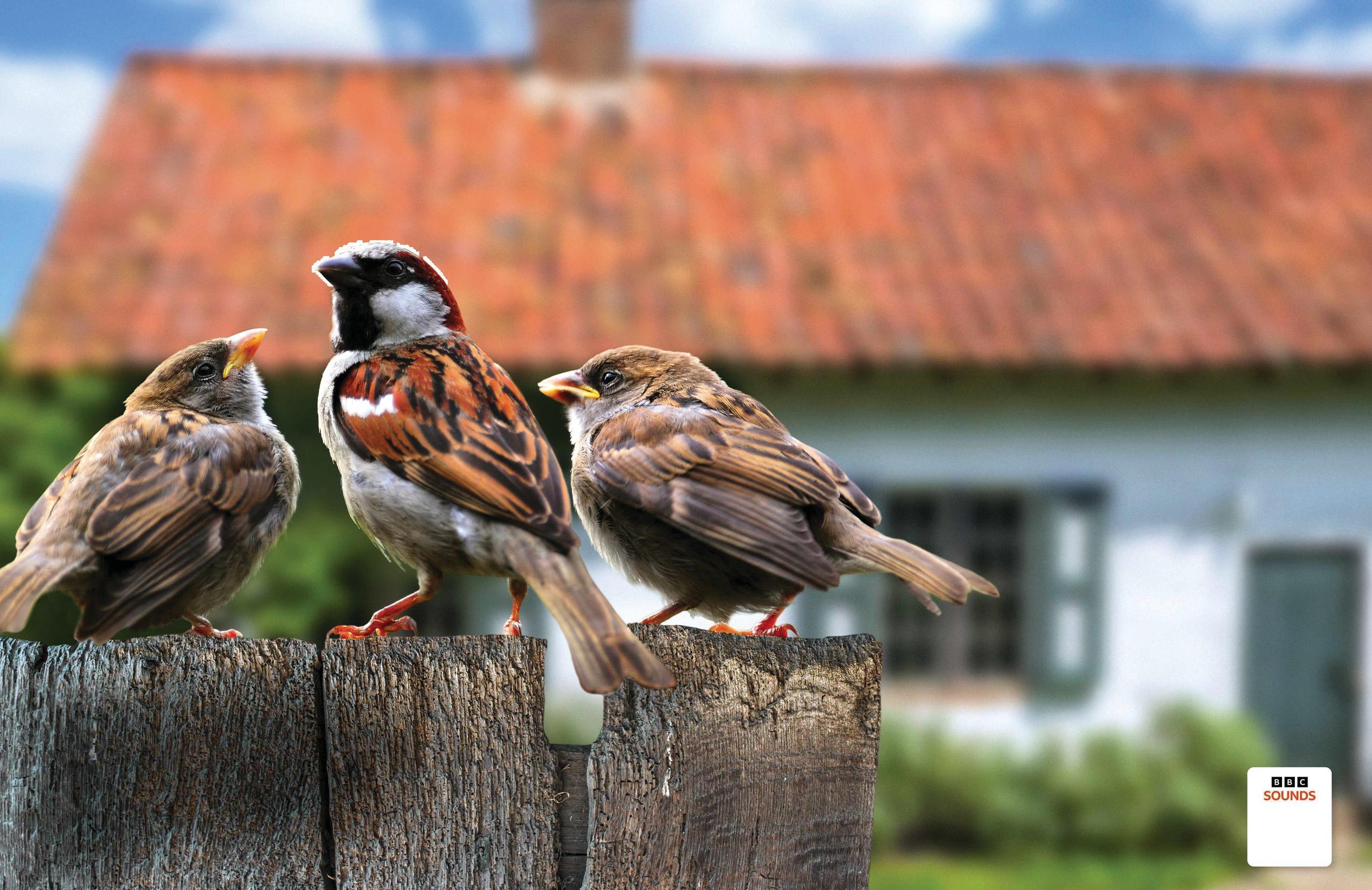
THE CLATTER OF TRAFFIC IS PIERCED MOMENTARILY by the sound of my drill screaming into the brickwork. I'm halfway up a ladder clinging to the chimney of my local pub, the Red Lion (which is ironically painted green), surrounded by an expansive landscape of concrete, interspersed by the occasional fluffy green bush.
My assistant, Matthew, relays screws to me with an outstretched arm. He has offered his assistance in return for a supermarket meal deal.
It’s August 2021 and we’re installing birdboxes around Portsmouth in the warmth of a golden sun. This is the seventh of the day. Four are already in place on the pub’s exterior and, earlier this morning, two went up on the walls of an antique furniture shop. Bar the boisterous gangs of gulls, there’s only one bird around, and it’s the very species we’re trying to create a home for: the humble house sparrow.
House sparrows, you see, need our help. They may be regarded as common brown birds, yet these characterful little passerines are struggling. We still don’t know exactly why, but in urban areas, it’s likely the result of air pollution attacking their delicate lungs; a catastrophic decline in their invertebrate prey; disease, including avian malaria; and the loss of the older buildings – complete with loose tiles, crooked eaves and other nooks and crannies – in which they nest.
Between 1966 and 2016, we lost a staggering 21.7 million of them, almost one per minute. The scenes of urban hedges fat with chestnut bodies and parks loud with evocative squabbles are now a distant memory. Hyde Park was once thronged with hundreds of sparrows but, like many other parts of the capital, has fallen silent.
This story is from the {{IssueName}} edition of {{MagazineName}}.
Start your 7-day Magzter GOLD free trial to access thousands of curated premium stories, and 9,000+ magazines and newspapers.
Already a subscriber ? Sign In
This story is from the {{IssueName}} edition of {{MagazineName}}.
Start your 7-day Magzter GOLD free trial to access thousands of curated premium stories, and 9,000+ magazines and newspapers.
Already a subscriber? Sign In

Jump Around - Bagheera Kiplingi - The acrobatic spider with a predilection for veggie food
Spiders eat flies, right? everyone knows that the 45,000 or so spiders in the world are all obligate carnivores, more or less – eating other animals, mainly invertebrates. Nature, however, loves an exception, and one particular spider missed out on that ecological memo. It goes by the wonderful scientific name of Bagheera kiplingi, and its claim to fame is that its diet is – at least mostly – vegetarian.

Female of the Species - Zebras - A strong sisterhood is key to staying safe
Zebras are masters of confusion. Their collective noun is ‘a dazzle’, which is fitting since their bodies and behaviour have been surprising scientists for centuries.

See It, Save It? - Wildlife tourism can be a powerful ally in protecting nature - but it can also harm it. We weigh up the pros and cons.
The sums of wildlife travel aren’t as simple as more tourists equals happier nature. How much did my visit really contribute to the conservation of Lady Liuwa and her habitat – and was that outweighed by carbon emissions from my flights? Did my presence disturb the animals’ natural behaviour more than it reduced the threat of poaching or benefited local communities?The question of whether wildlife travel is, on balance, good for wildlife is a complex one – and there’s no simple answer.

Can Your Really Offset Emissions? - Planning an overseas wildlife-watching trip entails facing some inconvenient truths
Imagine (or maybe you don't need to) that you hanker after the safari trip of a lifetime in sub-Saharan Africa. A 17-day tour beginning at the iconic Victoria Falls, passing through Zimbabwe, Zambia, Malawi and Tanzania, taking in some of the continent’s most wildlife-rich national parks, and ending on the lush island of Zanzibar.

Metamorphosis: a life-changing event
WITH EVOLUTIONARY BIOLOGIST JV CHAMARY

New series for BBC One: Asia
Settle in this autumn for a new natural-history extravaganza on BBC One and iPlayer: the longawaited Asia, presented by Sir David Attenborough.

Loss of Antarctic sea ice could impact seabird food supply
Albatrosses and petrels may be forced to fly further to feed

Tarsiers in trouble
Urgent action is needed to ensure survival of the Yoda-like primate

SNAP-CHAT
Chien Lee on shrew loos, rogue drones and being rained out of bed

VISIONS OF NATURE
The winners of the Wildlife Artist of the Year competition 2024, from David Shepherd Wildlife Foundation